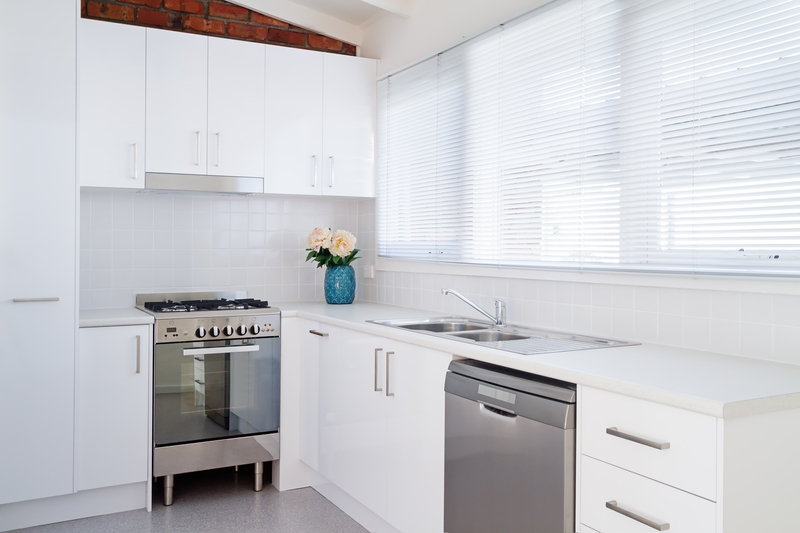Achieve a Clutter-Free Move with Expert Tips
Posted on 30/05/2025
Achieve a Clutter-Free Move with Expert Tips
Moving to a new home is an exciting opportunity for a fresh start--but it can also be overwhelming, especially when you're faced with piles of clutter you don't want to take with you. An organized move not only saves you time and money but reduces stress and helps you settle into your new space seamlessly. If you're wondering how to achieve a clutter-free move, you're in the right place! Discover comprehensive, expert advice and proven strategies to master your move and embrace your new beginnings with confidence.
Why a Clutter-Free Move Matters
Decluttering before moving offers numerous financial, emotional, and practical benefits. Consider the advantages:
- Lower Moving Costs: Moving companies charge based on weight and volume. The less you bring, the less you pay.
- Faster Unpacking: Unpack only items you truly need and love, streamlining the entire process.
- Quick Settling-In: A clutter-free home is easier to organize and personalize, making your new space truly yours.
- Improved Well-Being: Clearing out unwanted items can be an emotional release, giving you a fresh, uncluttered start.
- Eco-Friendly: Donating, selling, or recycling reduces landfill waste and benefits the community.
By following expert moving tips and organizing your efforts, you ensure your transition is both smooth and rewarding.

Step-by-Step Plan for a Clutter-Free Move
1. Start Early--Give Yourself Time
The secret to any clutter-free move is time. Start packing and decluttering at least 6-8 weeks before your move. This buffer lets you thoroughly assess your belongings and avoid last-minute chaos. Early planning gives you space to make rational decisions rather than emotional ones.
2. Create a Comprehensive Moving Checklist
Checklists keep you on track and ensure you cover every detail. Break your tasks down by room or category. Prioritize areas with the most accumulation, such as closets, attics, or garages. A checklist might include:
- Sorting and decluttering each room
- Researching donation and recycling options
- Packing non-essential items first
- Arranging moving supplies and boxes
3. Declutter: Sort, Sell, Donate, Recycle, Dispose
Decluttering for moving is the cornerstone of a hassle-free relocation. Use the Four-Box Method in each room:
- Keep: Items you use regularly and truly value
- Sell: Items in good condition with resale value
- Donate: Gently used items that could help others
- Recycle/Dispose: Damaged or outdated items
Ask yourself, "Have I used this in the last year?" or "Would I buy this again today?" If the answer is no, it's time to let go.
4. Tackle One Room at a Time
Moving can easily become overwhelming if you try to declutter your entire home at once. Instead, focus on one area per day or week. This method prevents burnout and allows for meticulous sorting. Start with storage spaces, then progress to more frequently used rooms.
Expert Tips for Effective Decluttering
Embrace the KonMari Method
The KonMari Method, popularized by Marie Kondo, encourages you to only keep items that spark joy. Touch each item, and if it doesn't make you happy or serve a functional purpose, thank it and let it go. Integrating this expert tip ensures your new home only contains meaningful possessions.
Set Realistic Decluttering Goals
Set small, attainable goals for each session. For example, "declutter bedroom closet in one afternoon." Short sessions are less intimidating and make it easier to stick to your plan.
Digitize Important Documents
Piles of paper add unnecessary weight and clutter. Digitizing documents (using scanning apps or a scanner) keeps sensitive information organized and secure, while drastically reducing paper clutter in your new space.
Enlist Help from Family or Friends
Decluttering is easier--and sometimes more fun--with others. Invite friends or family to help evaluate items objectively. They can encourage you to let go of things you might otherwise keep for sentimental reasons.
Schedule Donation or Pickup Services in Advance
If you plan to donate large items, contact local charities, shelters, or furniture banks early. Some offer free pickup, but may require prior scheduling. This ensures you aren't left scrambling on moving day.
Organizing and Packing for Maximum Efficiency
Invest in Quality Packing Supplies
Use strong, durable boxes, packing tape, bubble wrap, and markers. Fragile or valuable items may require special moving containers. Label every box with its contents and destination room in your new home.
Pack Strategically--Room by Room
Start with seasonal or rarely used items and leave daily essentials for last. Keep things organized with clear labeling and color-coded stickers or tape. For electronics and appliances, take photos of setups for easier reassembly later.
Use Up Food, Toiletries, and Cleaning Supplies
As moving day approaches, focus on finishing up perishable goods, non-essential toiletries, and cleaning products. This minimizes waste and reduces packing needs.
Keep an Inventory
Maintain a detailed inventory list to track what's been packed and which items are going where. This is especially helpful if using multiple moving vehicles or storage units, and makes unpacking easier.
Expert Moving Advice for Special Items
Handling Sentimental Belongings
Sentimental items--such as family heirlooms, old photos, or childhood mementos--are the toughest to sort through. Set aside time to thoughtfully go through these possessions. If it feels too difficult to let go, consider photographing items as a way to preserve memories without keeping every single object.
Dealing with Furniture and Large Items
Before moving bulky furniture, measure entryways in your new home to ensure everything fits. Consider selling or donating items that are worn, outdated, or no longer match your style. Disassemble furniture where possible to save space and make transport safer.
Managing Specialty Items (Books, Electronics, Tools)
- Books: Only keep your favorites or those with sentimental value. Libraries, hospitals, or local shelters often accept book donations.
- Electronics: Donate or recycle outdated gadgets. Back up data or perform factory resets before parting with devices.
- Tools: Sort through your collection and donate duplicates or tools you rarely use.
Common Moving Mistakes to Avoid
- Procrastination: Leaving packing or decluttering until the last minute leads to stress, haphazard packing, and unnecessary moving expenses.
- Packing Everything: Avoid boxing up items you don't genuinely need in your new home. Remember, every additional box costs extra time and money.
- Forgetting to Label Boxes: Clear labeling is a must for quick, organized unpacking.
- Neglecting Utilities: Overlooked tasks--like disconnecting or transferring utilities--can cause disruption in your new home.
After the Move: Staying Clutter-Free
Your new environment is a blank canvas--maintaining a clutter-free lifestyle is just as important after unpacking. Here are key tips:
- Unpack Methodically: Start with essentials and proceed room by room, reassessing items as you go.
- Organize as You Unpack: Don't just transfer clutter! Implement storage solutions, such as shelves, baskets, or closet systems, from the beginning.
- Regularly Declutter: Schedule periodic decluttering sessions to keep your new home streamlined and tidy.
Bonus: Expert Insights on Moving with Kids and Pets
Moving with Children
Involve your kids in the moving process by allowing them to sort through their own belongings. Encourage them to donate toys and clothes they've outgrown. Turn packing into a game and keep a few favorite items accessible for comfort during the transition.
Moving with Pets
Keep your pet's essentials packed last and accessible. Introduce them gradually to the new home to ease anxiety. Ensure safety on moving day by confining pets to a quiet, secure area or arranging for pet care while movers are present.

Final Thoughts: Your Path to an Organized, Clutter-Free Move
Embarking on a clutter-free move doesn't have to be daunting. With thorough preparation, strategic decluttering, and smart packing, you'll enjoy a streamlined, cost-effective, and satisfying relocation. Use these expert tips for achieving an organized move to transform your transition--and set the stage for a happy, harmonious start in your new home.
Ready to move clutter-free? Start today, embrace the process, and look forward to the freedom and clarity an organized move brings!
FAQ: Clutter-Free Moving Advice
- How far in advance should I start decluttering for a move?
It's best to begin decluttering at least 6 to 8 weeks before moving to have ample time to sort, sell, donate, and pack thoughtfully. - What should I do with items I'm unsure about?
Set them aside in a "maybe" box. Revisit the box a week later--if you haven't missed the items, it may be safe to let them go. - How do I get rid of unwanted furniture?
Sell through online marketplaces, donate to charities, or schedule a pickup with local organizations well in advance of moving day. - What's the best way to pack efficiently?
Pack room by room, label everything clearly, and use quality supplies. Declutter before you start to avoid packing unnecessary items!
If you're preparing for your next move and want expert tips to stay clutter-free, bookmark this guide and revisit as you pack. An organized move starts now!
Latest Posts
Key Strategies for Pre-Moving House Cleanliness
Strengthen Your Skills: Lift Heavy Items Alone
How to Securely Store Your Freezer When It's Not Running

_result.jpg)
_result.jpg)




